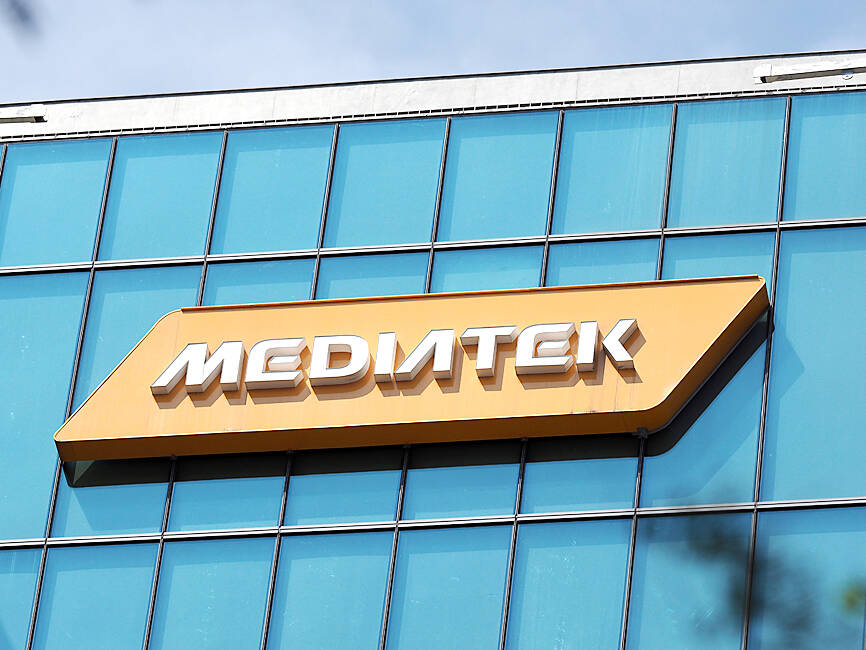MediaTek Inc (聯發科), the largest integrated circuit designer in Taiwan, yesterday introduced a new processor — Kompanio Ultra — which it described as the latest milestone for artificial intelligence (AI)-powered, high-performance Chromebook computers.
The new platform leverages MediaTek’s technologies and innovations to bring on-device AI capabilities, superior computing performance and leading power efficiency to the newest Chromebook Plus devices, the company said in a statement.
Chromebooks based around the Kompanio Ultra processor are to go on sale in the coming months, MediaTek said.

Photo: EPA-EFE
The Kompanio Ultra platform is MediaTek’s most powerful Chromebook processor to date, and is built using the 3-nanometer processing technology, the company said.
It integrates 50 trillion operations per second (50 TOPS) of AI processing power to enable on-device generative AI experiences, MediaTek said.
The Kompanio Ultra also powers seamless multitasking and entertainment to provide multi-display support for up to two external high-definition 4K screens, while advanced Hi-Fi audio processing ensures clear calls and immersive sound, the company said.
“We worked closely with Google to ensure the newest Chromebook Plus devices enjoy next-generation on-device AI capabilities, superior performance per watt and immersive multimedia,” MediaTek vice president, and computing and multimedia business manager Adam King said in the statement.

Intel Corp chief executive officer Lip-Bu Tan (陳立武) is expected to meet with Taiwanese suppliers next month in conjunction with the opening of the Computex Taipei trade show, supply chain sources said on Monday. The visit, the first for Tan to Taiwan since assuming his new post last month, would be aimed at enhancing Intel’s ties with suppliers in Taiwan as he attempts to help turn around the struggling US chipmaker, the sources said. Tan is to hold a banquet to celebrate Intel’s 40-year presence in Taiwan before Computex opens on May 20 and invite dozens of Taiwanese suppliers to exchange views

Application-specific integrated circuit designer Faraday Technology Corp (智原) yesterday said that although revenue this quarter would decline 30 percent from last quarter, it retained its full-year forecast of revenue growth of 100 percent. The company attributed the quarterly drop to a slowdown in customers’ production of chips using Faraday’s advanced packaging technology. The company is still confident about its revenue growth this year, given its strong “design-win” — or the projects it won to help customers design their chips, Faraday president Steve Wang (王國雍) told an online earnings conference. “The design-win this year is better than we expected. We believe we will win

Chizuko Kimura has become the first female sushi chef in the world to win a Michelin star, fulfilling a promise she made to her dying husband to continue his legacy. The 54-year-old Japanese chef regained the Michelin star her late husband, Shunei Kimura, won three years ago for their Sushi Shunei restaurant in Paris. For Shunei Kimura, the star was a dream come true. However, the joy was short-lived. He died from cancer just three months later in June 2022. He was 65. The following year, the restaurant in the heart of Montmartre lost its star rating. Chizuko Kimura insisted that the new star is still down

While China’s leaders use their economic and political might to fight US President Donald Trump’s trade war “to the end,” its army of social media soldiers are embarking on a more humorous campaign online. Trump’s tariff blitz has seen Washington and Beijing impose eye-watering duties on imports from the other, fanning a standoff between the economic superpowers that has sparked global recession fears and sent markets into a tailspin. Trump says his policy is a response to years of being “ripped off” by other countries and aims to bring manufacturing to the US, forcing companies to employ US workers. However, China’s online warriors